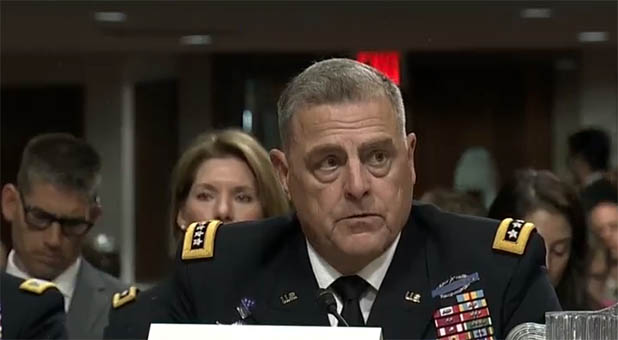This Is What Happens When the President Doesn’t Trust His Military Leaders
During the 2016 presidential campaign, Republican nominee Donald Trump took a lot of criticism for suggesting President Obama has “reduced the generals to rubble.”
But, when each military branch’s top officer testified Monday about the sorry state of military readiness, they pretty much confirmed he was correct—again. They were reporting to the Senate Armed Services Committee about the national security dangers of mandated budget caps when Sen. Lindsey Graham (R-S.C.) asked an important question.
“Have you told the president what you’re telling us about the state of the military under sequestration?” he asked. “Have you had a conversation with the commander-in-chief, telling him what you just told us?”
Their collective answer was nearly unanimous.
“I have not personally had a conversation,” Chief of Staff of the Army Gen. Mark Milley said. Chief of Naval Operations Adm. John Richardson, Chief of Staff of the Air Force Gen. David Goldfein, and Marine Corps Commandant Gen. Robert Neller each simply answered, “No.”
According to the Washington Times, it underscores a problem Obama has faced throughout his presidency: He doesn’t trust his top generals and admirals. As The Times reported:
Robert M. Gates, Mr. Obama’s first defense secretary, wrote in his memoirs that Mr. Obama deeply distrusts senior military leaders and suspects them of conspiring against him. He recalled one meeting in which the president resorted to a clipped “That’s an order” to the top brass.
“That order was unnecessary and insulting, proof positive of the depth of the Obama White House distrust of the nation’s military leadership,” a “shocked” Mr. Gates wrote.
“The controlling nature of the Obama White House and the staff took micromanagement and operational meddling to a new level,” he said in his memoir, Duty. “I think Obama considered time spent with generals and admirals an obligation.”
Mr. Gates’ successor, Leon E. Panetta, wrote in his memoir, Worthy Fights, that the White House—read Mr. Obama—saw generals who swayed from its talking points as conspirators. One incident involved a disagreement over troop levels in Afghanistan.
“The White House saw this as a coordinated effort to limit the president’s decision space, while Gates saw it as evidence that the Pentagon brass was unable to stay on message,” Mr. Panetta wrote. “For my part, it seemed that the leading generals saw the problem the same way and weren’t good about keeping quiet, but not that they were organizing a campaign against their president.”
Since Gen. George Casey completed his four-year term as Army Chief of Staff in 2011, Obama has gone through three more replacements. He’s also gone through three Marine Corps Commandants, although one—Gen. Joseph Dunford—is now Commander of the Joint Chiefs of Staff.













